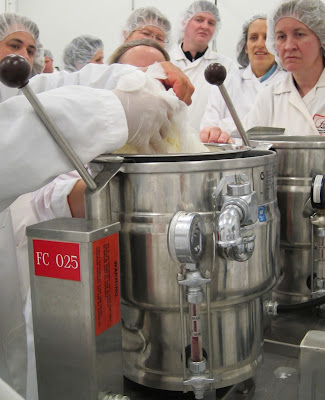Level Ground Trading Ltd.: Fair Trade Coffee
Quality Coffee: linking fair trade producers and consumers
 Collective Coffee on 20th Street in Saskatoon serves various brands of high-quality coffee, including Level Ground Trading’s fair trade espresso, which has received a 90-point score from Coffee Review.
Collective Coffee on 20th Street in Saskatoon serves various brands of high-quality coffee, including Level Ground Trading’s fair trade espresso, which has received a 90-point score from Coffee Review.Josh Del Sol, Roastmaster and Quality Control for Level Ground recently visited Collective Coffee, and I had the opportunity to talk with him and participate in a cupping (coffee tasting) that he organized.
Level Ground Trading
Level Ground Trading was established in 1997 by four Canadian families who wanted to establish direct relationships with groups of small-scale farmers in developing countries and help them benefit socially, environmentally and economically from the trade relationship while at the same time offering consumers ethical choices.
Level Ground’s initial conversations were with a group of small-scale coffee farmers in Colombia who wanted to send their children to school. Level Ground began importing their coffee and established educational scholarships for their children. Over the next few years, the company’s operations spread to Bolivia and Peru and, in 2006, to Ethiopia and Tanzania.
The company also started importing dried fruit from the trees shading coffee plantations as well as Colombian cane sugar.
Level Ground products have been sold in Ten Thousand Villages stores across Canada from the very beginning, and Ten Thousand Villages continues to be Level Ground’s largest customer.
Quality and fair trade
By 2007, Level Ground was bursting at the seams. They needed more space, but they also needed new procedures. Costco had agreed to sell their coffee, but this meant they would have to establish a food safety system. The company also wanted to obtain organic certification for their production facility.
Joshua Del Sol had many years of experience producing and distributing organic food. His expertise was invaluable in helping Level Ground to establish quality control procedures that would take the company to the next level.
Josh’s first step was to develop the product line. He tweaked the roasts so that they changed with the seasons, and he introduced unique roasts for each country of origin.
Measuring quality
Josh’s next task was to measure and evaluate the quality of the coffee. Rigorous quality measurement has two benefits: the company can guarantee a quality product for consumers, and they can help producers to continually improve their crop, thereby increasing sales. “The company story sells the first bag of coffee, but future purchases will be based on taste,” says Josh. “If the quality isn’t in the cup, and if we aren’t roasting it well, we wouldn’t be able to keep buying and selling more.”
The farms: Ensuring the quality of the coffee begins in the farmers’ fields. Selective picking is particularly important as the berries don’t all ripen at the same rate. New plants are planted next to established plants so that they can benefit from the strong root network that has already been established.
Level Ground works with a large number of small-scale farmers (2,000 in Ethiopia alone), so they aren’t able to visit each individual farm. Instead, they visit the co-operative and a cross-section of the farmers.
For various reasons (cost, proximity to non-organic farms), not all the farms are certified organic. But all the farmers are encouraged to follow environmentally-sustainable practices.
As Jaime Vargas, a Colombian farmer explains, “If I apply those chemicals to my coffee, I’m the first victim and you’re the last.” Vargas makes compost to nourish his plants and uses the methane that it produces to provide electricity for his home.
The beans: The coffee beans are evaluated for size and number of defects. “I’m a bean counter,” explains Josh. “I dump them out and count the number of defects [e.g. insect damage, misshapen unripe beans, etc.] in a 350-gram sample.”
The taste: A regular cupping program to evaluate the taste of the coffee is the third stage in the quality control process. Owners and employees from each branch of the company participate in order to ensure that every demographic has a voice.
Linking producers and consumers
Level Ground reports the quality findings to the producer, indicating shortcomings so that there can be improvement. I tasted a very distinctive light roast coffee from the Philippines. The product is not yet on the market because it is failing its quality tests. But Level Ground continues to work with the farmers to help them so that one day they will be able to sell their product internationally to consumers who are looking for an ethically-produced, quality product.
Level Ground has been importing coffee from Tanzania for the past six years. In the first year, they imported one container (300 sacks or 18,000 kilos). Over the years, the quality of the coffee has improved dramatically, and the company expects to import at least six containers from Tanzania in 2011.
There are both direct and indirect benefits for the farmers. All the coffee in Tanzania is sorted by hand, so it creates work for the women, who receive access to health care for themselves and their families as part of their compensation package.
In addition, through matching funds from various partners, Level Ground was able to grow an initial anonymous donation of $2,000 into $8,000 – enough to build a maternity wing for Mbozi Mission Hospital.
Purchases
Level Ground coffee is served and sold in a wide variety of stores, coffee shops and restaurants across Canada. A store locator is provided on the company’s website, although I noticed that it was not a complete list for Saskatoon.
Collective Coffee
Collective Coffee is now open from 8-5 from Tuesday to Friday, from 10-5 on Saturdays and Sundays, and closed on Mondays.







Comments